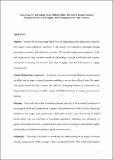| dc.contributor.author | Patrucco, Andrea Stefano | |
| dc.contributor.author | Rivera, Liliana | |
| dc.contributor.author | Mejía-Argueta, Christopher | |
| dc.contributor.author | Sheffi, Yossi | |
| dc.date.accessioned | 2021-11-03T17:17:09Z | |
| dc.date.available | 2021-11-03T17:17:09Z | |
| dc.date.issued | 2021-07-13 | |
| dc.identifier.uri | https://hdl.handle.net/1721.1/137248 | |
| dc.description.abstract | <jats:sec><jats:title content-type="abstract-subheading">Purpose</jats:title><jats:p>In line with the knowledge-based view of organizations, this paper aims to analyze how supply chain (SC) employees contribute to the creation of competitive advantage through knowledge acquisition and utilization activities. The authors consider SC employees' skills and competencies, their external network of relationships, their job satisfaction and company investments in training and test how they relate to SC-level outcomes (i.e. SC growth).</jats:p></jats:sec><jats:sec><jats:title content-type="abstract-subheading">Design/methodology/approach</jats:title><jats:p>The authors design a research model including the aforementioned variables, and the authors apply structural equation modeling (SEM) to survey data collected from 246 SC professionals in Latin America. The authors also use multi-group analysis to evaluate how the relationships between these variables change with different levels of company investment in training.</jats:p></jats:sec><jats:sec><jats:title content-type="abstract-subheading">Findings</jats:title><jats:p>The results show that a broad professional network of relationships contributes to increasing the skills and competencies of SC professionals, which, in turn, impact job satisfaction and SC performance. This reinforces the value of investing in skilled human talent, who can contribute to knowledge acquisition, utilization, and, ultimately, to SC competitiveness. Companies that invest more in training to develop their SC employees benefit from stronger SC outcomes.</jats:p></jats:sec><jats:sec><jats:title content-type="abstract-subheading">Originality/value</jats:title><jats:p>This study contributes to broadening the understanding of the impact of human resource management (HRM) on supply chain management (SCM). One of the added original foci of this research is the emphasis on developing countries where these HRM-to-SCM performance relationships have not been studied before.</jats:p></jats:sec> | en_US |
| dc.language.iso | en | |
| dc.publisher | Emerald | en_US |
| dc.relation.isversionof | 10.1108/ijlm-11-2020-0426 | en_US |
| dc.rights | Creative Commons Attribution-Noncommercial-Share Alike | en_US |
| dc.rights.uri | http://creativecommons.org/licenses/by-nc-sa/4.0/ | en_US |
| dc.source | Other repository | en_US |
| dc.title | Can you grow your supply chain without skills? The role of human resource management for better supply chain management in Latin America | en_US |
| dc.type | Article | en_US |
| dc.identifier.citation | Patrucco, Andrea Stefano, Rivera, Liliana, Mejía-Argueta, Christopher and Sheffi, Yossi. 2021. "Can you grow your supply chain without skills? The role of human resource management for better supply chain management in Latin America." International Journal of Logistics Management, The, ahead-of-print (ahead-of-print). | |
| dc.contributor.department | Massachusetts Institute of Technology. Center for Transportation & Logistics | |
| dc.contributor.department | Massachusetts Institute of Technology. Department of Civil and Environmental Engineering | |
| dc.relation.journal | International Journal of Logistics Management, The | en_US |
| dc.eprint.version | Author's final manuscript | en_US |
| dc.type.uri | http://purl.org/eprint/type/JournalArticle | en_US |
| eprint.status | http://purl.org/eprint/status/PeerReviewed | en_US |
| dc.date.updated | 2021-10-21T15:07:43Z | |
| dspace.orderedauthors | Patrucco, AS; Rivera, L; Mejía-Argueta, C; Sheffi, Y | en_US |
| dspace.date.submission | 2021-10-21T15:07:45Z | |
| mit.journal.volume | ahead-of-print | en_US |
| mit.journal.issue | ahead-of-print | en_US |
| mit.license | OPEN_ACCESS_POLICY | |
| mit.metadata.status | Authority Work and Publication Information Needed | en_US |
